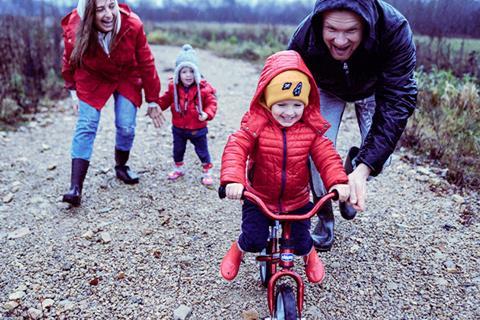Jo Rowe discovered a way of looking at parenting that transformed her approach
I had a lot of theories on parenting before I had kids. I had weighed and judged other parents and decided that, when I had kids, I would do things differently. I had grand plans of angelic, perfect children that only ate organic, broccoli-heavy meals, kept their bedrooms tidy and always asked to go to bed on time. I am now 15 years into parenting my four children and aware of just how unrealistic and probably unhealthy those expectations were.
It quickly became clear to me that children were far from blank canvases that I could mould to my will, but they came pre-programmed with wills of their own, characters and worse…a desire to exert control in much the same way I did.
Parenting is tough, if we want to do it well, it is hard work, constant and intentional. Just as we feel we have a plan and a handle on one parenting issue, the kids grow and change and a new one pops up! It is the only job of extreme responsibility that you need no university degree for, no prior experience and no idea what you are doing. It’s a learn-on-the-job, fly-by-the-seat-of-your-pants, ride-or-die adventure. And it doesn’t end, even when your kids grow up and leave home.
For these reasons, I decided I needed all the help I could get. Thus began my ravenous quest for parenting wisdom. I have read, listened to and practised as many books, talks and podcasts as I can get my hands on. I have asked every parent for tips. I have taken courses and read psychology books and searched the Bible for wisdom. I have desperately tried to equip myself because I want to do this parenting thing as best as I can. It’s hard!
I have also had to sift and weigh every idea and lesson though, as not all parenting strategies I have learnt about have fitted well with our family or our values. But eight years ago I came across the most helpful approach that has shaped the way I parent.
I happened across an interview with Andy and Sandra Stanley of North Point Ministries, after a desperate search on podcasts for “help with parenting tweenagers”! We’d had a particularly difficult few weeks with our eldest daughter who, at eight, was pushing back on boundaries and I desperately needed a fresh perspective!
They introduced me to the idea of seasonal parenting. This idea fitted together so beautifully with the child development psychology that I learnt in my nursing days, that it just made sense. In the same way our kids grow and enter new developmental phases, so must our parenting. Each season of parenting addresses our responsibility as parents balanced with what our kids need most at different developmental stages.
As parents our main objective is to help our kids grow into adults that are fully equipped to make excellent choices in accordance with their values and beliefs. We want to grow people who are self-disciplined, motivated and can think unselfishly and act with compassion. To do that we need to let our kids practise making age-appropriate decisions and let them feel the consequence of those decisions. The tricky part is knowing how to do that! These four seasons of parenting have helped me recognise when I am exerting too much control and when I need to step in and take back control.
Andy and Sandra Stanley have listed these seasons in four categories – the discipline years, the training years, the coaching years and the friendship years.
The discipline years – zero to five years old
These are the years where we need to teach our kids that decisions and behaviour have consequences. If they touch the fire, they will get burned. If they walk into the road, they could get hurt. These years are the teaching of boundaries and what happens when they cross those boundaries. In this developmental stage they don’t have the reasoning of ‘why’, they just need to know the ‘what’. We are teaching them the value of yes and no, right and wrong.
The child’s needs are focused around control – they need to learn what is in their control and what is not theirs to control!
The parental responsibility is consistency – our boundaries remain the same, children learn by consistent consequences. Children at this age are exploring their remits of control. If our boundaries remain consistent then they learn to recognise how to adjust their behaviour. For example, if they refuse to hold a hand while walking beside the road they will always be strapped into the buggy. I regularly made the mistake in this season of using too many words and reasoning too much! I quickly learnt that reasoning with a two-year-old is the way to madness!

The training years – six to twelve years old
The training years are teaching our children the ‘why’ to our previous ‘what’. These are the years that we are passing on the reasoning behind decisions. We are helping our kids think through potential consequences before making a choice. It is important to begin passing natural consequences on to our kids. For example, not rescuing them from forgotten homework or misplaced PE kit! We can be compassionate about their mistakes but allow them to feel them all the same.
The child’s need in this season is to gain understanding – kids want to understand the reasoning behind the decisions. If you happen to have kids in this developmental season, I am sure you have experienced the endless question: “Why?” and the backchat on decisions. They are trying to understand and think through decisions. A simple “yes” or “no” does not wash any more! This is an excellent opportunity to create connection through decision making, using phrases like: “What do you think will happen if…?” or “What would you do if…happened?”
Our parental responsibility is creating a worldview – we are training our kids to understand how their behaviour affects others and the world around us.
The coaching years – twelve to 18 years old
As parents this can be the hardest to do. It’s the beginning of letting go! In this developmental stage our aim is to let our kids experience as many of their own natural consequences as they can. That doesn’t mean that, to use a sporting term, we can’t yank them off the field of play if they are behaving badly. Rather our aim here is to be advising and coaching from the sidelines, rather than micromanaging their decisions. This requires connection. And this is our premier responsibility in this season. Encouraging and creating opportunities for connection and conversation is the most important thing.
Our teen’s primary needs in this season is self-belief and support – the greatest tip I ever got for this season is: “Don’t freak out!” My friend, who had three teenagers at the time, said that that was the best advice she had ever been given for the coaching years. No matter what our kids tell us, or ask our advice on, our calmness and ability to talk (even if we are freaking out on the inside) will keep the doors of connection open. I am practising my poker face.
The friendship years – 18-plus years.
Your child’s primary need is space – our kids are adults! This means that they will need space to make their own decisions and, sometimes, mistakes. Our kids need our trust that they are equipped to deal with life. Hopefully, they know we are right there if they need us, but children need to leave their parents and make a way on their own. This is crucial for developing independence and security.
Our parental responsibility is support – we are there when they need us, but we also get to benefit from their wisdom and maturity. These are the years of connection and friendship.
We discovered this framework for parenting relatively late for our eldest daughter and we have had to overlap some of the years. We had to do some discipline in the training years, and some training in the coaching years, but with our subsequent children, we have managed to fit better with the age boundaries. This has been a roadmap for our response to our kids’ choices and behaviour.
In those early discipline years, when one of our kids didn’t obey and ran through a crowded car park, correcting bad choices happened immediately with a swift consequence. During the training years, more explanations were given along with the correction. At the moment, we are in the coaching years; our responses to our kids’ bad choices are guided through conversation. We haven’t reached the friendship years yet, but I guess we’ll have to watch our kids make a choice and wait for an invitation to talk about it! Ouch!
Seasonal parenting helps us to grow with our kids, partner with them, and provide them with what they need to flourish into adulthood.































